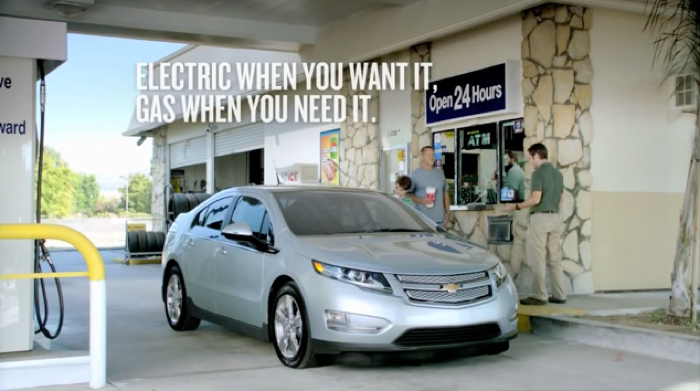 I often see comments on Facebook’s Chevy Volt Owners group (a great group for those wanting to learn about the Volt or EVs in general) about GM or the dealerships not “pushing” Volts. Things get particularly heated, when a state legislature or court opposes Tesla Motors’ sales model being “banned” from the state, due to NADA or dealership opposition. In the past year, sitting behind a sales desk at a dealership, I’ve gotten a new perspective on this. I’ve said this before, but here I go again:
I often see comments on Facebook’s Chevy Volt Owners group (a great group for those wanting to learn about the Volt or EVs in general) about GM or the dealerships not “pushing” Volts. Things get particularly heated, when a state legislature or court opposes Tesla Motors’ sales model being “banned” from the state, due to NADA or dealership opposition. In the past year, sitting behind a sales desk at a dealership, I’ve gotten a new perspective on this. I’ve said this before, but here I go again:
The lack of sales effort and knowledge is NOT due to the dealers, it’s the profit margin that is to blame (for the salesperson, dealership and GM). The sale of a Volt (or just about any EV) is an educational sale. The time it takes to educate a customer about an EV, charging, battery life, tax incentives, etc. is money down the drain for a salesperson. In the time it takes to sell an EV, they could have sold two or three trucks or sportscars. EVs are so new that the profit margin (on which the salesperson is paid) is very thin, exacerbating the problem. In your job, if you could do a task that took very little effort, but paid very highly, versus a task that was very difficult but paid very little, which would YOU choose to do?
Salespeople are mercenary. They do what they do for money (like all of us). Trying to get them to spend extra time selling something that doesn’t earn them much, is like trying to push a rope. Dealerships can coax them with a little extra money, but if there are lower-hanging fruit to pick, they (like most people) will grab it.
 Although I have no particular insight into GM, I’m sure the same is true with the Volt. Volt owners are appalled at the lack of advertising GM does for the Volt, especially when compared to relative newcomers to the market, like the Kia Soul EV. A GM executive has acknowledged that they lose money on every Volt sale. Again, if you were selling lemonade at a loss, would you still stand at the curb, pushing your lemonade aggressively?
Although I have no particular insight into GM, I’m sure the same is true with the Volt. Volt owners are appalled at the lack of advertising GM does for the Volt, especially when compared to relative newcomers to the market, like the Kia Soul EV. A GM executive has acknowledged that they lose money on every Volt sale. Again, if you were selling lemonade at a loss, would you still stand at the curb, pushing your lemonade aggressively?
That being said, there are some salespeople (like me) that feel the adoption of EVs is their mission. We are willing to take the time to learn as much as possible and teach as much as possible (even speaking at events on our own time, blogging, etc) in order to move the world forward, toward a better day. There are also some dealers (like the one I work for) who pay bonuses for EV sales, even when these bonuses turn a profitable sale into a loss. They install multiple chargers and allow their customers to charge for free. Some, (like the one I work for) pay their customer’s 1st year of charging at an affiliated charging network, even though it further reduces profitability. They, like us, want to see the world move toward a sustainable future and I salute them for it.
As customers, we should try to recognize dealers (and salespeople) who support EV adoption and support them by:
- Buying from them rather than shopping on price alone.
- Referring others to the dealer/salesperson, every time we tell people about our wonderful EVs.
- Letting dealership management know when you’ve had a great interaction with a salesperson who’s obviously gone above and beyond for you.
- Letting the dealership’s owner know how important you feel EVs are for the future of our country & planet.
Are some dealership owners greedy? Yes. Some portion of ANY population is motivated primarily by greed. However, some dealers are deeply involved in charitable works as well as making money, but don’t crow to the world about it (again, like the one I work for).
Many are enraged, when dealers or their lobbyists (like the National Automobile Dealers Association or NADA) oppose the non-dealership paradigm of Tesla Motors’ sales model (or more accurately “product education model”). The Tesla sales model, patterned after the Apple Store sales model, supports the educational sales cycle very well. How can they afford to do it? By compensating their sales staff at a relatively low salary instead of commission sales. A successful commissioned sales person is motivated to learn product and serve the customer, because that’s how they make a living. A car salesperson that doesn’t sell, doesn’t get paid. In the states that have banned the Tesla sales model, the salesperson doesn’t actually close the sale. They educate the consumer, who then goes somewhere else to access the Tesla website, and complete the transaction. Just like other types of corporations, as well as living creatures, auto dealerships want to survive. Their survival instincts will make them do things like fighting Tesla’s sales model at every turn, because they feel threatened by it. Even if their actions enrage the public, they will do it because they feel they have to.
Are there lazy, unethical salespeople, just looking to make a quick buck? Sure, but they won’t make it in the long run. They key to longevity in the auto sales business is referrals and repeat business from satisfied clients. I’ve had the honor, in my one year of automotive sales so far, to work with some of the most professional, fun, wonderful, helpful and charitable people I’ve EVER worked with, in any field in which I’ve worked.
The dealership sales model will be changed by EVs, but it will take time. Service Departments, in particular, will be savaged by the EV’s almost complete lack of scheduled maintenance. We are in a transitional period and are in uncharted territory. Dealers & salespeople (the good ones anyway) are feeling their way into this new era and learning as they go. In my honest opinion, the Tesla sales model is best for Tesla, at this stage of their development. Volume is low (compared to ICE vehicles), and they need the customer experience to be exceptional, so Tesla needs complete control over those selling them. In the future, when volume rises to the level of pickups or SUVs, NO amount of hiring will properly support their clientele. Even Apple has partners like Best Buy, Walmart, AT&T, Verizon, Sprint, etc. selling their products. I believe Tesla will eventually need a dealer network to keep quality up.
Just my 2¢.




Well said. Your respect for alternative views and desire to understand issues makes reading your post and enjoyable experience. Looking at motivation of perspectives goes further than simply criticizing them. Any company like GM cannot compel customers to buy simply by advertising. As Bob Lutz has expressed, GM needed to develop a modern power train to compete with the traditional hybrid. They chose to go with the Chevrolet brand because they though it might take off and be more popular. Those are decisions that take risks which is what companies do. The research and development process will eventually spread across product lines. Without that risk and simply business as usual would have made GM ultimately extinct. I look forward to forthcoming products and adjustments that will be made.
When I compare the purchasing experience of our 2012 Chevy Volt and our 2014 Tesla MS85, they were very similar in alot of ways. There was no “dealing” on the price of our Volt. We went online and built our vehicle and chose options. The Salesperson at our local Chevrolet Dealership confirmed everything and we made a down payment to order. In the entire process, the only time we even went to the dealership was to pick up the Volt and write the check. At that time, the sales staff knew very little and the few questions we had could not be answered by them and we turned to our Volt Advisor. Actually, on the day we picked the Volt up, we educated the salesperson on a number of features and the inner workings of the Volt. When we purchased our Tesla, we went to a test drive event and came home , accessed the website and built our vehicle. 45 days later we went to the local Tesla Service Center to pick up our vehicle and write the check. The exception was that in that 45 day period Tesla contacted at least 5 times to discuss and educate us on the features of our new vehicle and of course we were already active in forums and had learned a ton about the car, just as we had our Volt.
I believe there will always only be a small percentage of drivers who will even seek out an all electric plug in vehicle, like Tesla, Leaf, etc. A higher percentage will feel comfy with a hybrid or gas/electric like the Prius or Volt. I think range anxiety and fear of technology are huge factors. The largest percentage of drivers will still want to go to a dealership, kick the tires and haggle the price. Some because they think they will get the best deal and the savings is worth their time and aggravation. A large number of the tire kickers also need to hear the “vroom, vroom” of an ICE engine and will NEVER move away from that.
Until ICE powered vehicles are no longer produced (not in my lifetime or my kids lifetime) the majority of drivers will always lean toward them. The individuals that migrate toward the EV technology will always be frustrated and feel that their chosen vehicles are being shunned.
We took the Tesla to two car shows over the weekend. One of which was 90% muscle cars and classics over 20 years old. We were invited by a car club that had all classics and they thought it would attract some attention by having the Tesla there. Our vehicle had a crowd around it for three solid hours and my voice was weak from talking about it. We take both the Volt and Tesla to Cowtown Cars and Coffee on the 2nd Saturday and we have lots of interest there as well.
I challenge all of the EV owners to get out and group up and talk your vehicles up. Trust me people will listen.
All of this is just my humble opinion. Thanks Buzz for your interest in the EV revolution
Teresa, I’m a bit more optimistic than you about this revolution. most EV owners I’ve spoken to are never going back to ICE. For that reason, I see a tipping point coming. Most of us have talked our friends’ ears off about our cars and piqued their curiosity. Because I changed my career to promote EVs, I get the pleasure, almost every day, of seeing someone’s facial expression when they first drive a Volt. I LOVE THAT!
Buzz I did not mean to sound to pessimistic about the EV revolution. But I do really feel that there is a demographic that will never migrate toward green. I do talk about our vehicles to everyone. But I see it in even my own family. They say the words in agreement and follow it with all kinds of excuses. They love their gas guzzlers and vroom vehicles.
But, like i said above…the EV people need to get out in casual settings, like Cars and Coffee, etc and talk it up. People are interested, but apprehensive.
I am glad that you have given Classic Chevy a chance to have a knowledgeable individual to help the clients. Dealerships cannot expect to snag the new EV owner if questions cannot be answered. WTG Buzz
I agree with Buzz that the phenomenon of EV’s is going to spread like oil on the water. As Teresa says, the demand for “gas guzzlers and vroom vehicles” will be strong for years to come, but somewhere along the line, a paradigm shift will happen, when suddenly it becomes cool to own a silent, powerful, clean car. And the vroomers will start to feel silly with their controlled explosions and carbon emissions. I don’t know if I’ll live long enough to see it, but it will happen.
The main problems for EV sales right now are ignorance and disinformation, the latter disseminated deliberately by conservative media. One of the prime purposes of advertising is to provide product information, and that’s what GM should be doing. So many people I talk to think that a Chevy Volt will go 40 miles and then quit, or that they catch fire all the time. After a couple minutes’ discussion, they are interested enough that they might buy one. Judicious advertising with carefully crafted messages could really help.
The problem of lack of profitability in the service department is a real one. I read somewhere that car dealerships depend for 70% of their profit on repairs and maintenance. The electric vehicles will never support this. My Volt’s recommended maintenance schedule is a tire rotation every 7500 miles, and an oil change every 24 months minimum. I think this alone mitigates in favor of a manufacturer-owned sales office, with salaried and incentivized salespeople. At the very least, the service/maintenance problem will require at least a major re-think of the dealership business model.
I generally agree but for one misconception. GM does not lose money with each Volt sale. Detailed analysis of the BoM and P&L for the Volt very clearly shows that GM makes some money on each Volt .. it may not be the same amount they make on a Silverado but it is money. The more they sell, the more they will have recouped their development costs, and the more lucrative each subsequent sale become.
Normally, I would agree with you. The problem is, I’ve seen a GM executive state, for the record, that GM loses “a little money” on each Volt sold.